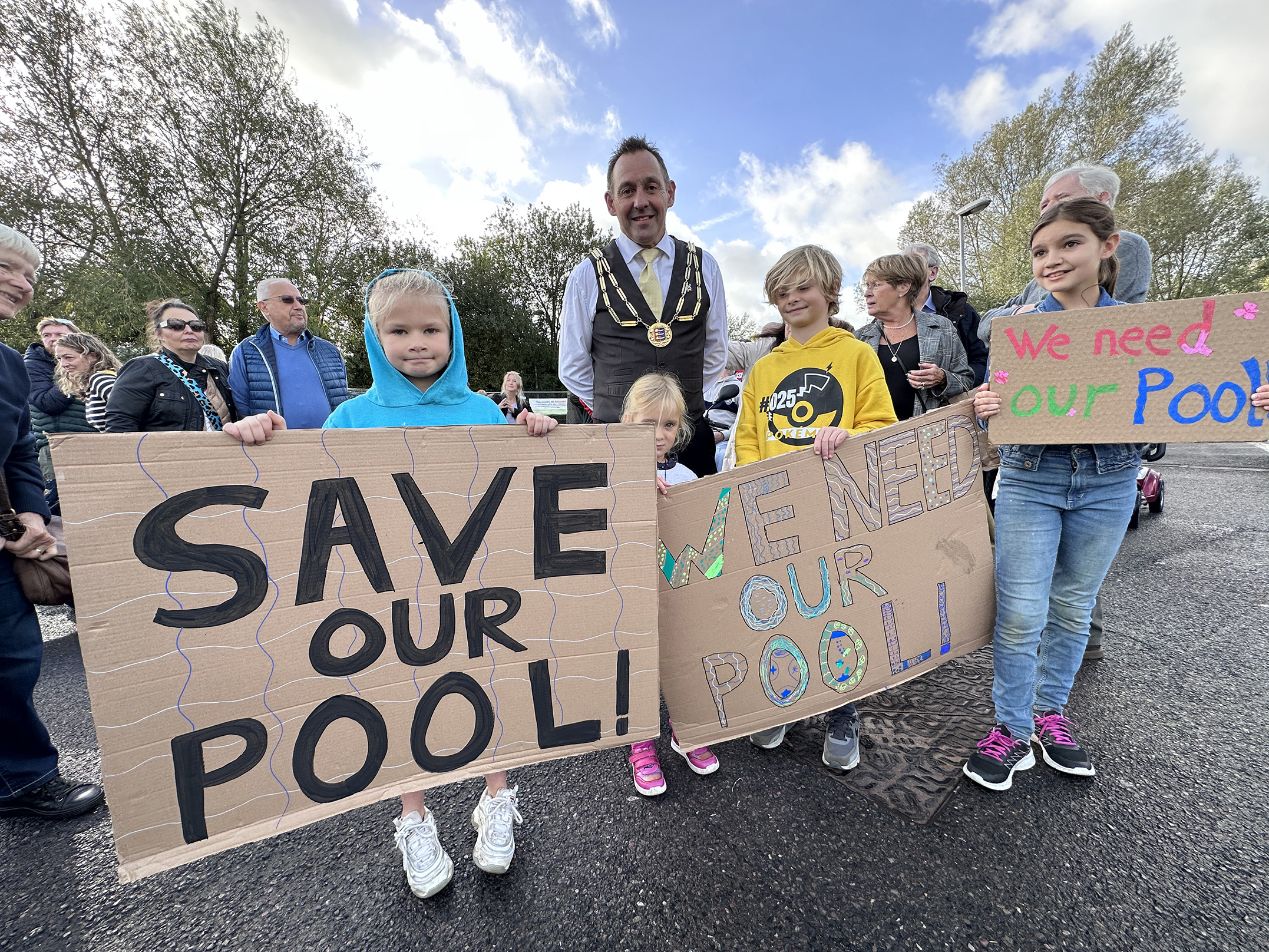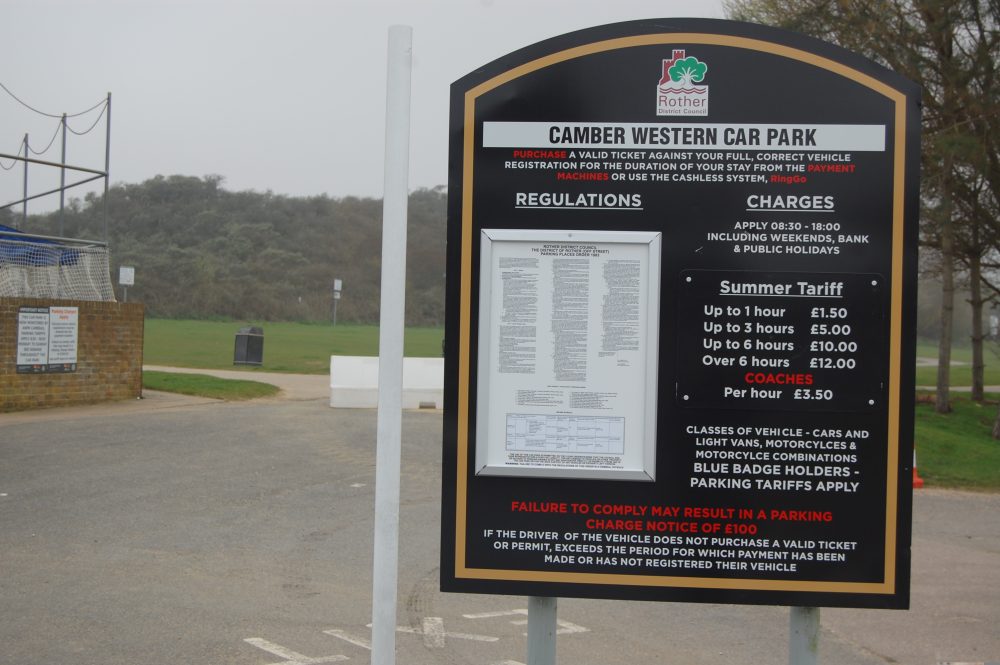Rother District Council Cabinet had their meeting on Monday, December 12. The minutes confirm not only the latest position regarding the temporary closure of Rye swimming pool but also plans for increasing permit parking and car parking charges in the Camber car parks.
The following extracts from the published document give an overview of what was discussed.
Cabinet had received minutes arising from the meeting of the Overview and Scrutiny Committee (OSC) held on November 28, 2022 that had considered the temporary closure of Rye Swimming Pool. It had been a well-attended meeting and the Chair of the OSC acknowledged that whilst there was currently no solution, all stakeholders were actively engaged in working together to try and reopen the pool as soon as possible.
The Chief Executive advised that the Council had been in receipt of a petition concerning the closure of the pool and whilst it had not contained enough signatures to trigger a full Council debate, the matter had been raised by the OSC and Rother District Council was actively working with Freedom Leisure (FL), Rye Town Council and the community to explore all possible options to keep the pool open.

It was also confirmed that the Strategic Community Infrastructure Levy Allocations Panel had received a high-level interest bid in terms of reducing the reliance on fossil fuels and identify a sustainable solution to assist in keeping the pool open. It was clear that a new model to maintain and fund leisure facilities was required, and this was currently being worked through across the country, it was not peculiar to Rother District Council and FL.
It was considered that many businesses across the district were suffering as a result of the current energy crisis and the government needed to do more to support the high energy usage sectors that were in need, rather than a blanket approach which included profitable businesses.
Officers were requested to continue lobbying the local MPs and organisations such as the Local Government Association. Primary Care Partners could also be requested to contribute, whilst recognising this was unlikely, the general and physical health, recuperative and mental health benefits derived from swimming would ultimately have an impact on their budgets.
Is there a solution yet?
The committee resolved that:
1) Rother District Council continued to work with Freedom Leisure and Rye Town Council to explore options;
2) officers continue to lobby local MPs and local government organisations;
3) a report be brought to the Overview and Scrutiny Committee in the new year outlining the options available and their financial implications.
A meeting took place between Rye Town Council and Rother District Council on Tuesday, December 20 and Rye News has received the following statement from the Town Hall:
“It is anticipated that William Coatesworth, a risk and compliance officer who has kindly offered to examine Freedom Leisure’s Rye Pool accounts, will be in possession of relevant material early in the New Year. In the meantime, the Town Council is continuing to meet with Rother District Council to consider options, including ways to ensure that both the Pool – and Sports Centre – have a long-term, sustainable future.”
In addition, our MP, Sally-Ann Hart attended a meeting of the all party parliamentary group (APPG) on swimming this week when problems relating to pools around the country, as well as Rye, were discussed. She reports as follows:
“The minister, Stuart Andrew, attended the APPG meeting. I am afraid that there is nothing further to add other than the minister is concerned about the plight of public swimming pools, has highlighted how important swimming is to his own health and well-being and has also spoken to the Chancellor (as I have). Several other MPs highlighted swimming pools in their constituencies that have recently closed or are about to close. We all asked that the Chancellor make known his decision as soon as possible so that organisations and local authorities can plan. I understand that he is leaving it as long as practicably possible to see what happens to wholesale energy prices. I do know that the Secretary of State for DCMS (Department for Culture, Media and Sport), Michelle Donelan, is also speaking to the Chancellor.”
Between our local councils, our MP and now the APPG, pressure is being brought onto the Chancellor to provide financial help for the leisure industry and both our councils regard this possible help as an important element in enabling an early reopening of the Rye pool. There is no indication yet as to when or if a decision will be made.
Another item on the RDC meeting agenda was current parking charges and parking permit charges. It was recommended that the car parking charges remained unchanged for 2023/24 but that parking permit prices across the district be increased by 43% (from £350 to £500 per annum).

Due to significant increase in costs to manage Camber Western Car park, it was recommended that the summer season tariffs (from April 1 to September 30) be increased in all Camber Sands car parks. The increased charges would be as follows: £3.00 (up to 1 hour), £7.00 (1 to 3 hours), £14.00 (3 to 6 hours) and £18.00 (6+ hours).
Some members were concerned at the level of increases within the proposed car parking charges and sought deferment due to its impact on residents, visitors and businesses alike. This would enable officers and members to carry out a review of all charges to include consultation, including sensitivity analyses, hours of operation and consideration of the viability of offering weekly / monthly tickets.
Following discussion with the local member present, it was agreed to increase the fees at the Camber car parks, as these were primarily used by visitors, but to also include Camber in the review. There was a fine balance at Camber to ensure that the charges were not too high to deter patrons, leading to an increase in antisocial parking.
Image Credits: Rye News library , Kt bruce , Kenneth Bird .




So visitors already moan about the parking charges at Camber, this is just going to discourage them from using the car parks even more, so there will ge even more people trying to avoid the charges by parking in the roads, gardens and drives. Thanks again Rother!
Which is why the Camber Car Park Charges have not been increased by as much as would be fair and reasonable. Rother Full Council last Monday debated “Operation Radcott” the rolling multi-agency (Police, ambulance, RNLI, Biffa waste etc) operation led by Rother. The management of the sea, sands and traffic is a colossal undertaking and a heavy responsibility. Even with the car parking charges the financial outcome for Rother is at best neutral.
A couplle of years ago Rother was successful in persuading the County Council to introduce Cvil Parking Enforcement in the district. This has made possible the use of enforceable yellow lines at Camber. The problem is that the national penalty for parking on the lines is much too low, and represents good value for a day out for a family. Central government has recently refused to increase the penalty to a more realistic level. If you have concerns about that Sally-Ann Hart MP is the person to write to.
Not sure that £3 for 1 hour is reasonable. Can park on street in Rye for 2 hours for £1. Perhaps if Rother are losing money running the car park they should make it free… more people might use it and solve some of the other parking issues. Most of Camber doesn’t have yellow lines and CPE don’t seem effective, as they go home before it gets busy.
And then of course there’s the ‘affordable’ housing to be built on a car park. Sorry former putting green…
The whole of Romney Marsh is a potential free car park, with it’s own drainage and on-site building materials, so I find it weird that the council have to charge anything at all, never mind “manage” it at exorbitant cost. It could simply buy some of the farmland adjacent to the road (isn’t some of it Crown land already?). That would then negate the need for council employees and managers to “manage” the free car parks.
Whilst basic human rights legislation grants the right to freedom of movement within a state (article 13.1) , it appears to have forgotten to include the right to actually stop. That loophole allows the state to extort a parking “tax” to visit the ill in hospital, to go shopping or to have a day on the beach from those who use a car to do so.